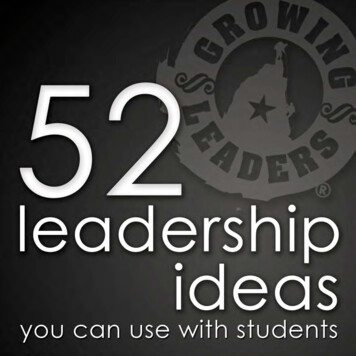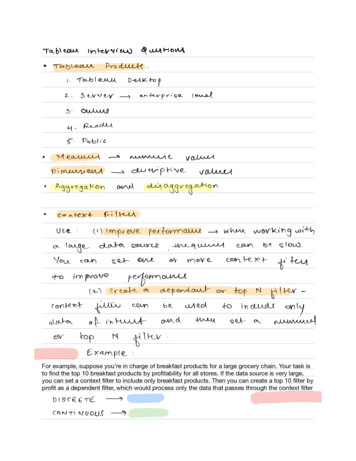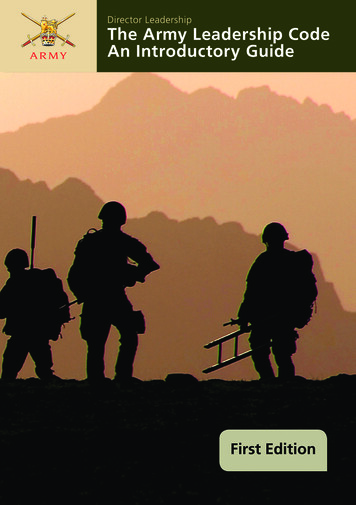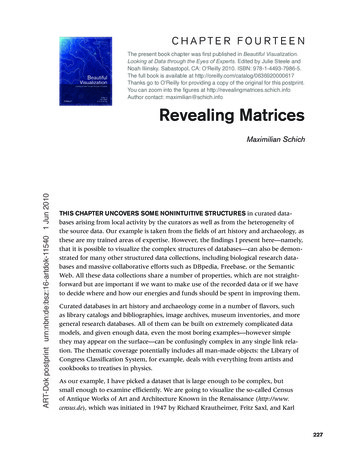
Transcription
52 Leadership Ideas You Can Use With Students DevelopingLeadership Qualities in Students from Kindergarten to CollegeTable of ContentsHow to Get the Most Out of This Book . . .21. Cultivating the Gift . . 32. Building Character and Discipline. .43. Building Vision and Creativity . .74. Building Relational Skills .105. Building Planning Skills . .146. Building Problem Solving Skills . 177. Building Values and Ethics . 208. Building Courage and Risk Taking Skills . .239. Building Teamwork and Servanthood . .2610. Building Communication Skills . 2911. Building Identity and Self Esteem . 3212. Confirming the Gift . . 3513. Bonus Idea: A Rite of Passage 38Tim Elmore / Growing Leaders, Inc. / Copyright 2012 / Atlanta, GA / www.GrowingLeaders.com1
Leadership Ideas for KidsHow to Get the Most Out of This BookYou don’t have to read this book all the way through. That’s the beauty of it. It is designed tobe a small reference guide to you as a parent, teacher or campus worker. It is chalk full ofideas that are inexpensive, easy to pull off, and that teach some ingredient of leadership to theyoung person with whom you share them.These ideas can be used at a school, at home, at a civic organization, at a nonprofit group, ata church youth group, at a company or at a retailer who employs students. Some of the ideasare better suited for college students, while others are better in a middle school or high schoolcontext. Still others are ideal for a K-12 school. You’ll notice many of the ideas can be usedwith any age—only the conversation afterward will vary.I’ve included fifty-two ideas. There is one for each week of the year. They are listed underten categories. I suggest you select the young person you wish to invest in, then evaluatewhat they most need to learn about leadership. Is it people skills? Is it problem solving? Howabout vision? In addition to the 52 ideas, I’ve included a bonus idea in this expanded edition.Once you pick the category, try one idea per week. Here’s what I would do if I were you.First, determine to do the idea with them. You are a tour guide not a travel agent. Don’t justtell them what to do and where to go—go with them and do it together. You’ll both be betterfor the experience, and you’ll have more talking points afterward.Second, prepare them for the experience. The ideas include field trips, interviews withleaders, exercises around the house, conversations around a TV show or video, andexperiments with others in your community. Just in case you are more excited about teachingthem leadership than they are to learn it, you’ll want to talk with them and get them mentallyready for the time you spring it on them.Third, keep a journal of your experiences together. Ask them to do it, too. This will enableyou to chart their growth and record exactly what you were thinking and feeling along theway. Later, you can actually spot the improvements you both make.Educators have confirmed that people learn 10% of what they hear; 50% of what they see,but 80% of what they experience first hand. Be sure you don’t reduce this to a lecture oneach subject. Gently push them to try the ideas themselves. You’ll find that many of them arejust plain fun, and will spark both great conversation as well as lots of laughter.My goal is that these ideas will help you and your students grow as individuals and as leaderson your life journey. They’re designed to expand the student’s positive influence in thisworld. I believe you’ll see great fruit from practicing these ideas.Tim Elmore / Growing Leaders, Inc. / Copyright 2012 / Atlanta, GA / www.GrowingLeaders.com2
Cultivating the GiftTwo years ago, our daughter Bethany turned thirteen. Prior to her birthday, we had alreadynoticed signs of her becoming a teenager. There was a hint of an independent spirit; she hadformed definite opinions on every topic; she requested a cell phone and a personal televisionfor her room; public kisses from dad were embarrassing; and she was already shaving herlegs! (Aren’t girls supposed to wait until after they get married to do that?)Because my wife, Pam, and I recognized the significance of this time in her life, we decidedto do something to help her transition well into womanhood. In Jewish culture, young menand women experience a bar mitzvah or a bat mitzvah. These celebrations are designed to bea rite of passage into adulthood. In America, most of us have no such ceremony. Our closestevent is getting a driver’s license or high school diploma. Consequently, boys grow older, butoften don’t grow up. Girls want the privileges that come with age, but not the responsibilitiesthat go with it. Pam and I decided to plan a significant year for Bethany that would enableher to be ready for a life of responsibility and leadership.We sat down with Bethany, and selected six women whom we would ask to be one-daymentors for her. Over the next year, these women met with our daughter and let her shadowthem for a day. They let her watch them at work, at home or on a trip. During that day, eachof them shared a “life message” with Bethany. A message they wish someone had sharedwith them when they were 13, but no one did.What happened was amazing. These women took our idea to a whole new level. Sara, anurse, knew that Bethany was considering becoming a nurse, as well. So she took her to ahospital maternity ward and the two of them spent the day helping mothers give birth tobabies. That afternoon, Sara took Bethany to a class she taught for teenage mothers, many ofthem unwed mothers. At the close of the day, Sara’s life message for Bethany revolvedaround abstinence. (You can imagine that her message got through to Bethany much betterthan my lecture on the subject!)Holly took Bethany on a one-day mission trip to urban Atlanta, where she worked withunderprivileged kids who live in government housing. Betsy, a flight attendant, surprisedBethany by flying her up to New York City, months after the September 11th attacks. Oneafter another, these ladies invested in our “little girl” one day at a time, for a year. Theydiscussed topics like radical integrity, service, making your life an adventure and how to useher influence for noble purposes.These women’s voices still ring in Bethany’s ears. Their messages weren’t different thanours, but their voices were. Over the year, we noticed Bethany gaining confidence. Shebecame secure when making difficult choices and experienced an increasing influence withher peers. We believe this community of mentors solidified our values in the home.At the end of the year, we brought these six women together for an evening of celebration.You can read about it in the final section of this book. The night brought the mentoringprocess to a climax for Bethany. The evening had “teeth” to it, however, because of theexperiences that occurred during the year.Tim Elmore / Growing Leaders, Inc. / Copyright 2012 / Atlanta, GA / www.GrowingLeaders.com3
Building Character and DisciplineTim Elmore / Growing Leaders, Inc. / Copyright 2012 / Atlanta, GA / www.GrowingLeaders.com4
It’s Good For YouSit down and discuss the things you and your young person really don’t like doing. It may bea habit like sweeping the garage or some other chore around the house. It may be listening toor interacting with someone who seems un-loveable. It may be physical exercise or thediscipline of waiting. It could even be eating a vegetable you don’t like.Choose two of these “undesirables” and make them disciplines. Deliberately do what youdon’t like doing. Practice them daily for one week. Put them down on the calendar and holdeach other accountable to do them. (If you do them for two weeks, chances are they willbecome a good habit!)Afterward, discuss the results. Did you feel a sense of accomplishment? Did you waver inyour commitment? Talk about how daily disciplines pave the way for conquering lazinessand indifference. How have you gained a personal victory by practicing these disciplines?Walk Through a GraveyardAt sunrise or sunset one day, drive out to a local graveyard. If you can, find an old one,where the gravestones have descriptions on them of the people who are buried there. Walkthrough the property, reading the epitaphs of each one you pass.Afterward, sit down and discuss what you saw. Think about the lives of those who aredescribed on those gravestones. Then, talk about the future. What kind of person does youryoung person want to be, as an adult? What do they want to accomplish before they die?What will be their values? Their purpose? Their methods? What are their motives?Take a few minutes and journal these thoughts on paper. Consider that we have a mission tolive for and it is our goal to discover and work towards that mission.Leadership InterviewSelect a community leader who exhibits integrity and discipline. Set up an interview withthem and ask them how they built that discipline in their life. Ask them how they determinedto live with integrity, and how they stick to it, when it is difficult. Ask them how they failedalong the way, and how they eventually gained victory over their flesh. Write down theiranswers and review them on the way home.Finally, think about how you can follow those who led you, and how you can learn from theirtriumphs and failures.Tim Elmore / Growing Leaders, Inc. / Copyright 2012 / Atlanta, GA / www.GrowingLeaders.com5
Promises, PromisesSit down and try to remember some promises you and your young person have made in thepast. Make a list of them, and be sure and include some you failed to keep.Next, select one of those unkept promises (to yourself or to someone else), and determine tokeep that promise for one whole week. Fix your eyes on it as a clear goal. Write it down, andhelp each other think of steps you can take to keep the promise. Hold each other accountable.Write notes to each other; remind each other daily.At the end of the week, talk it over. What does keeping a promise do to your sense ofintegrity? How does it positively affect your character? Does it strengthen your discipline?Remember that it is better that you should not make a promise than that you should make anpromise and not fulfill it.”Watching the NewsTake some time each night for a week and watch the evening news on television. Look fornews stories on people who either exhibited strong character (integrity and ethics) or failed todo so. (Trust me—these reports will not be hard to find.) Talk about each story andsummarize what you think they had decided that made them act the way the person did. Whatvalues had they determined to live by: self-centered; self-promoting and self-protecting orcivic-minded, others-centered and self-sacrificing.Next, I recommend both you and your student make a list of four to six words that you intendto live by; words you believe describe the man or woman you hope to become by the end ofyour life. Share your list of these “core values” with each other and tell why you chose thewords you did.Tim Elmore / Growing Leaders, Inc. / Copyright 2012 / Atlanta, GA / www.GrowingLeaders.com6
Building Vision and CreativityTim Elmore / Growing Leaders, Inc. / Copyright 2012 / Atlanta, GA / www.GrowingLeaders.com7
Bag of VisionFill a bag with several strange, unrelated items from around the house. The more weird theitems are the better. Then, have each family member reach in the bag and pull one out. Givethem a minute to think about it, then have them tell an imaginary story about the item—perhaps how it originated. Afterward, have them share a practical use for the item they’vechosen, for which it was not originally designed. The item should solve a problem or addressa human need in some way. Allow vision and creativity to flow.After this crazy little exercise, talk about the importance of vision and creativity. What roledoes our imagination play as we come up with new ideas to solve problems? What can weuse our ability to be creative and have vision for?Our imaginations can be used for good or bad purposes. Either way, they are powerful.Pick Up Your BurdenSit down with your young person, and talk about their school. What’s happening on theircampus? Once you get the conversation going, ask them to name one problem at their schoolthat really needs to be solved.Challenge them to “adopt” that problem as their own burden. Have them make a list of stepsthat could be taken to solve the problem. (These may be imaginary steps depending on thesize of the burden they have chosen). Get them thinking about their vision for helping makethe school a better place instead of complaining about how bad it is.Finally, have them write about, draw a picture or clip out photos from magazines that depictthe vision they have for their school. Have them create a mural if they wish. Then, post thesepictures in their room as a reminder to both pray and act on their vision.Spin the GlobeGather around your family globe. Talk about the different needs people have around theworld. Ask your young person to spin the globe, and have them point to a certain spot on it,as it revolves. When it finally stops, identify what country their finger is pointing.Then, discuss the culture, the people and the needs of that nation (the CIA World Factbookcan be very helpful!). Use the Internet, an encyclopedia, or a news source to determine theneeds and problems of that country. Finally, decide what one thing you could do to help thecountry you’ve discussed.Tim Elmore / Growing Leaders, Inc. / Copyright 2012 / Atlanta, GA / www.GrowingLeaders.com8
Find a Historical MentorSelect a biography of a great leader in the past. Find one about a man or woman who had abig vision, and accomplished something great for the world. Read the biography together, orat least a chapter from the book. You may want to pay your young person a good sum forreading the book—after all, they get paid for doing chores; why not pay them for feedingtheir mind and heart with inspiring stories?After they are finished with their reading, discuss the highlights of the book. Ask them whatthey enjoyed most about the story. Ask them how that leader caught his or her vision tomake a difference in the world. What enabled them to endure hardship and finally achievetheir goal?Creative ShoppingFor dinner one night, assign each of your young people one food item to shop for. Give themsome money, and send them to the grocery store. Allow them to pick whatever they want tobuy from a particular food group: protein, vegetable, fruit, dairy, starch, etc.When they arrive home, examine the variety of items they have chosen. Then, give thempermission to put on their creative thinking hats, and put together a great menu from whatthey have chosen. This will require both vision and creativity on their part. Help them onlywhen it is necessary.As you eat the meal, talk about their thinking process. How did they make the decisions onthe menu? What was the most creative part of the meal? How did they get the ideas theycame up with? Talk about how those who prove themselves trustworthy with little tasks areusually those entrusted with big tasks.Tim Elmore / Growing Leaders, Inc. / Copyright 2012 / Atlanta, GA / www.GrowingLeaders.com9
Building Relational SkillsTim Elmore / Growing Leaders, Inc. / Copyright 2012 / Atlanta, GA / www.GrowingLeaders.com10
Be a HostVisit the home of someone this week. Take your young person with you, and warn them towatch how well the person you visit hosts you, as guests. (You could also have them watchyou, as you host guests in your own home.)Afterward, talk about what it means to host others. A host is someone who takes initiativewith others and makes them feel comfortable. They often guide the conversation, and do a lotof listening in the process. Then, explain that relational leaders are “hosts” in therelationships and conversations of their life. They are not guests, waiting for someone to tendto them.Finally, have your young person practice hosting others this week. Have them focus on theneeds and interests of others in conversations, not their own. Have them find one goodquality about each person they meet and compliment them about it. Talk about how they aredoing each night as you close out the day.How’s Your Bedside Manner?Pick a holiday coming up this month to celebrate. It doesn’t have to be a big one. It couldeven be something like Ground Hog Day or St. Patrick’s Day. Use it as an excuse to visit ahospital (or a children’s hospital if you like), and celebrate the day with patients.Gain permission from the hospital staff to walk through a floor on the hospital and visit eachof the patients there. (Children’s hospitals are great!) Take a small gift to them and getacquainted with each of them. Encourage them, as you discover their need for listening andlaughing. Use this opportunity to build your people skills with those you don’t even know.Work at focusing on them, rather than yourself and your discomfort at being in a buildingfull of sick people. Look for ways to serve them.Afterward, discuss what you learned about people and people skills. What were somecommon discoveries you made about human nature? (i.e. we all like to be encouraged). Whatdid you discover about yourself and your relational skills?Love the One You Don’t LikeSit down together and talk about people who are difficult to be around—people who youdon’t connect with easily. (You might even be so bold as to say you just don’t like them).Then, each of you choose one of these people to focus on this week.Each day, direct your attention to them, but don’t announce what you’re doing to anyone.You may want to begin with conversation, giving them your undivided attention. Later, youmay write them a note, affirming any good qualities you see in them. Perhaps you can doTim Elmore / Growing Leaders, Inc. / Copyright 2012 / Atlanta, GA / www.GrowingLeaders.com11
something to serve them and meet a need in their life. Maybe in give them a gift. The key isto do something that demonstrates love each day.At the end of the week, talk about how you did. Was it hard? What made it difficult? Howdid the experience stretch you in your relational skills?People Skills TestThis idea can be done in a variety of ways. On a vacation or outing with your young person,tell them you are going to give them a “test” on their people skills afterward. Prepare them tointeract with others while on the trip—even a simple trip to a restaurant where you talk witha waitress. Don’t tell them what the quiz questions will be, but just prepare them to be readyto evaluate their experience when it’s over.When you are finished, sit down and give them the quiz. For example, after a meal at arestaurant, you may want to ask them: Did you remember the waitress’ name? What was it?Did you show interest in her personal life? Did you ask about her family? Did you leave herwith a word of encouragement? Were you able to give any words of wise counsel? Talkover questions like this. Being aware of these issues will eventually build good habits inrelationships.Listening TestThis one is fun, if you take it seriously. Determine that you and your student (s) will not talkabout yourselves for an entire day. You will only listen to others, and if you talk at all, it willbe about the other person with whom you are conversing. This exercise will force you tobecome completely “others-minded.”By not talking for a day, you will notice your listening skills will emerge. You will also findyou don’t have to say many of the things you typically say on any given day. Finally, youwill learn the power of focusing on others instead of yourself. This is the foundation ofrelational leadership.At the end of the day, discuss what you learned about yourself and about others. Can youcontinue a similar practice indefinitely?Tim
are better suited for college students, while others are better in a middle school or high school context. Still others are ideal for a K-12 school. You’ll notice many of the ideas can be used with any age—only the conversation af











